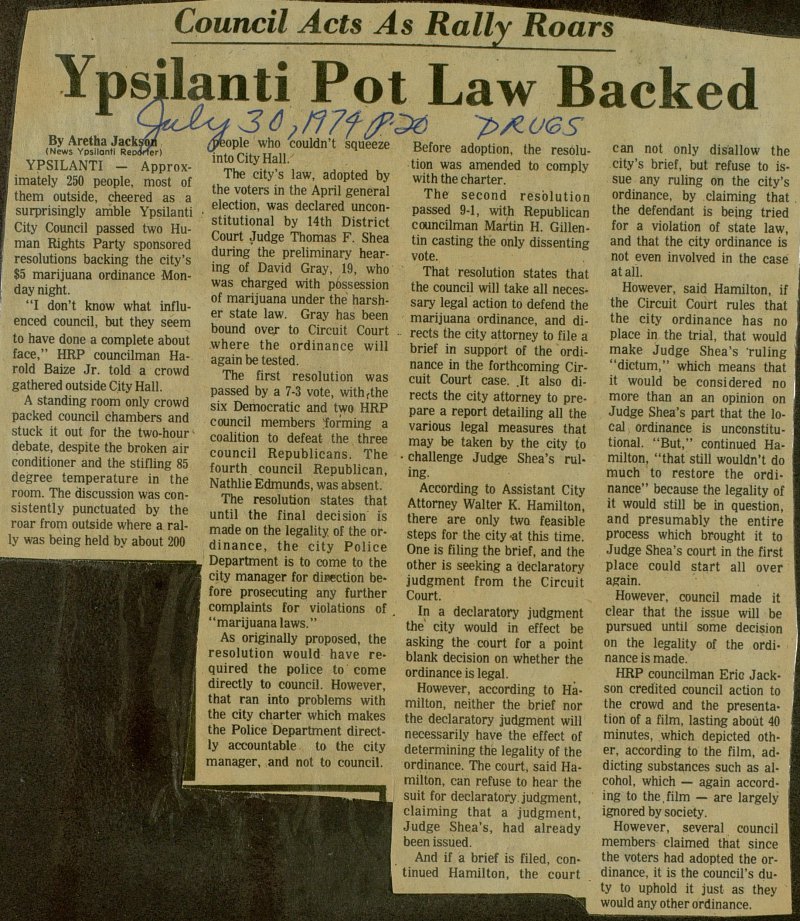Council Acts As Rally Roars: Ypsilanti Pot Law Backed

YPSILANTI - Approximately 250 people, most of them outside, cheered as a surprisingly amble Ypsilanti City Council passed two Human Rights Party sponsored resolutions backing the city's $5 marijuana ordinance Monday night. "I don't know what influenced council, but they seem to have done a complete about face," HRP councilman Harold Baize Jr. told a crowd gathered outside City Hall. A standing room only crowd packed council chambers and stuck it out for the two-hour debate, despite the broken air conditioner and the stifling 85 degree temperature in the room. The discussion was consistently punctuated by the roar from outside where a rally was being held by about 200 people who couldn't squeeze into City Hall. The city's law, adopted by the voters in the April general election, was declared unconstitutional by 14th District Court Judge Thomas F. Shea during the preliminary hearing of David Gray, 19, who was charged with possession of marijuana under the harsher state law. Gray has been bound over to Circuit Court where the ordinance will again be tested. The first resolution was passed by a 7-3 vote, with the six Democratic and two HRP council members forming a coalition to defeat the three council Republicans. The fourth council Republican, Nathlie Edmunds, was absent. The resolution states that until the final decision is made on the legality of the ordinance, the city Police Department is to come to the city manager for direction before prosecuting any further complaints for violations of "marijuana laws." As originally proposed, the resolution would have required the police to come directly to council. However, that ran into problems with the city charter which makes the Police Department directly accountable to the city manager, and not to council. Before adoption, the resolution was amended to comply with the charter. The second resolution passed 9-1, with Republican councilman Martin H. Gillentin casting the only dissenting vote. That resolution states that the council will take all necessary legal action to defend the marijuana ordinance, and directs the city attorney to file a brief in support of the ordinance in the forthcoming Circuit Court case. It also directs the city attorney to prepare a report detailing all the various legal measures that may be taken by the city to challenge Judge Shea's ruling. According to Assistant City Attorney Walter K. Hamilton, there are only two feasible steps for the city -at this time. One is filing the brief, and the other is seeking a declaratory judgment from the Circuit Court. In a declaratory judgment the' city would in effect be asking the court for a point blank decision on whether the ordinance is legal. However, according to Hamilton, neither the brief nor the declaratory judgment will necessarily have the effect of determining the legality of the ordinance. The court, said Hamilton, can refuse to hear the suit for declaratory. judgment, claiming that a judgment, Judge Shea's, had already been issued. And if a brief is filed, continued Hamilton, the court can not only disallow the city's brief, but refuse to issue any ruling on the city's ordinance, by claiming that the defendant is being tried for a violation of state law, and that the city ordinance is not even involved in the case at all. However, said Hamilton, if the Circuit Court rules that the city ordinance has no place in the trial, that would make Judge Shea's "ruling "dictum," which means that it would be considered no more than an an opinion on Judge Shea's part that the local ordinance is unconstitutional. "But," continued Hamilton, "that still wouldn't do much to restore the ordinance" because the legality of it would still be in question, and presumably the entire process which brought it to Judge Shea's court in the first place could start all over again. However, council made it clear that the issue will be pursued until some decision on the legality of the ordinance is made. HRP councilman Eric Jackson credited council action to the crowd and the presentation of a film, lasting about 40 minutes, which depicted other, according to the film, addicting substances such as alcohol, which - again according to the, film - are largely ignored by society. However, several council members claimed that since the voters had adopted the ordinance, it is the council's duty to uphold it just as they would any other ordinance.
Article
Subjects
Arthur Jackson
Ypsilanti Police Department
Ypsilanti City Council
Ypsilanti - Government
Republican Party
Marijuana laws
Marijuana Ordinance
Marijuana
Laws & Legislation
Human Rights Party (HRP)
Democratic Party
Courts - Washtenaw County
Ann Arbor News
Old News
Walter K. Hamilton
Thomas F. Shea
Nathlie Edmunds
Martin H. Gillentin
Harold Baize Jr.
Eric Jackson
David Gray